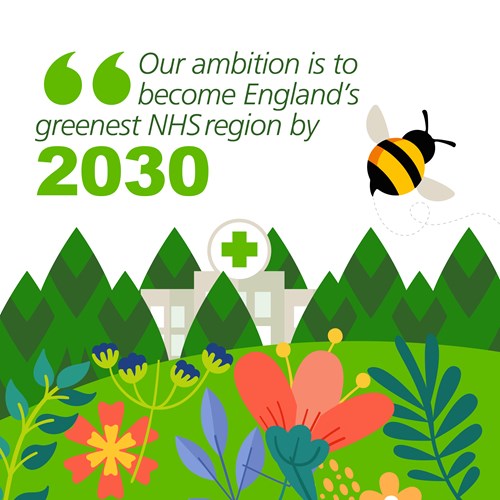Region’s NHS joins forces to tackle climate crisis and improve health

Ambitious targets for the North East and North Cumbria to become England’s greenest region by 2030 have been set out in a new NHS plan.
The North East and North Cumbria Integrated Care Board (ICB), working with the region’s NHS and other partners, has launched its first Green Plan outlining how it will reduce its carbon footprint to benefit not only the environment but also the health and wellbeing of local people too.
Chief executive of the North East and North Cumbria ICB, Samantha Allen, said: “Sustainable healthcare has a vital part to play in our ambitions to reduce health inequalities, improve the overall health of people in our region and prevent ill-health – they are all inextricably linked.
“As a region, healthy life expectancy is way behind the rest of the county and is currently under 60 years in nine of our 13 local authority areas. If we are going to address this, then we must look at the wider factors which impact on health – and the environment is a key one of these.
“For instance, we know air pollution is having a detrimental impact on health across the region with more attributable deaths per 100,000 people than London - despite London having considerably worse pollution.
“We also know that by keeping people healthy, they require less treatment and fewer medicines, which also has a lower impact on our environment - put simply a healthier planet means healthier people!”
The NHS contributes to 40 per cent of the public sector carbon footprint in the UK and the ICB's three-year plan sets out how it will drive forward changes to address sustainability across every aspect of the NHS with eight priority areas including:
- Reducing the amount of medicines wasted
- Changing gases used in operating theatres
- Using more electric vehicles
- Ensuring new buildings are eco-friendly
- Using renewable energy
- Re-thinking supply chains, switching to more sustainable products and buying local where possible
- Creating more greener spaces across healthcare sites
ICB, senior net zero programme manager, Dr Clare Winter, said: "The NHS is a massive consumer of energy from heating and lighting our buildings to powering the equipment that we use.
"We buy and use millions of products every day, some of which will have travelled the globe to get to our hospitals, doctors’ surgeries and clinics. Our ambulances, patient transport, delivery vans and our staff travel millions of miles every year and all of these contribute to climate breakdown and air pollution which then negatively impacts on the health of our local communities.
“So much is already happening across the region to reduce our environmental footprint but there is more we can do to make the crucial changes that are needed.
"This is why we have joined forces in this plan to set out a wider ambition to be the greenest region in England by 2030."
Actions across the region already include:
- Newcastle Upon Tyne Hospitals NHS Foundation Trust was the first healthcare organisation in the world to declare a climate emergency and has since gone on to pioneer many initiatives such as improving air quality around its hospitals and community health hubs.
- County Durham & Darlington NHS Foundation Trust's ‘Switch it Off’ campaign has encouraged a reduction in wasted energy.
- Gateshead Health NHS Foundation Trust and QE Facilities (Group) are set to install solar powered air source heat pumps in seven buildings across its sites – resulting in buildings becoming zero-carbon.
- Northumbria Healthcare NHS Foundation Trust was one of the very first NHS trusts to eliminate the use of desflurane gas (a more environmentally harmful anaesthetic gas) and has seen a 70 per cent reduction in CO2. Its Manufacturing Hub ensures a local supply chain for the NHS locally and has led the way in innovations including the recycling of face masks.
- North Cumbria Integrated Care NHS Foundation Trust are working in partnership with the Cumbria Wildlife Trust to help improve biodiversity at their hospital sites.
- North Tees and Hartlepool NHS Foundation Trust has invested in recycling waste bins, electric car charging points and solar panels.
- South Tyneside and Sunderland NHS Foundation Trust has switched to 100% renewable electricity resulting in an 80% reduction in emissions.
- Over the last year and a half staff and volunteers have planted more than 1,250 trees across sites managed by Cumbria, Northumberland, Tyne and Wear NHS Foundation Trust thanks to the NHS Forest project.
- Tees, Esk and Wear Valley NHS Foundation Trust is transforming a 3,500m2 area, across four sites, into wildflower meadows. It has also introduced four wellbeing gardens across the trust and introduced a wooded walkway at its Lanchester Road Hospital in Durham.
- South Tees Hospitals NHS Foundation Trust has joined the fight to reduce food waste by setting up an eco-shop.
- North East Ambulance Service NHS Foundation Trust established a wildflower planting trial at four ambulance stations. The trust, as part of their Green Plan, have committed to integrating green spaces across the estate of 57 properties both to benefit biodiversity as well as staff wellbeing.
Associate director of sustainability, Newcastle Hospitals, and sustainability lead for the NENC Integrated Care System (ICS), James Dixon, said:
"Our region aims to deliver its aspirational target of achieving net zero carbon for the NHS footprint, emissions it controls, by 2030 and the NHS footprint plus, emissions it can influence, by 2040 - ahead of national targets of 2040 and 2045.
"Together we are committed to developing a consistent approach, with our partners in the public and voluntary sectors, to increased sustainability, reduced consumption and recycling, improved air quality and carbon reduction, as well as increased access to green and blue spaces.
“The climate crisis is one of the biggest health challenges we face. Working across not just our NHS but with local authorities, wider partners and our communities, is a key part of our plan and will enable us to have a much wider environmental reach within our local communities."
- North East and North Cumbria Integrated Care Board (ICB) Green Plan: https://northeastnorthcumbria.nhs.uk/media/shnlqmug/icb-green-plan-main-document-final.pdf
- North East and North Cumbria Integrated Care Board (ICB) Green Plan Brochure: https://northeastnorthcumbria.nhs.uk/media/upzmhbqq/green-plan-booklet-v6.pdf
- North East and North Cumbria Integrated Care Board (ICB) Green Plan animation: https://northeastnorthcumbria.nhs.uk/our-work/wider-impact/sustainable-healthcare/
- Find out more: https://northeastnorthcumbria.nhs.uk/our-work/wider-impact/sustainable-healthcare/
